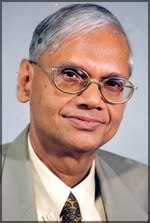Dissolution of PCs a correct move - Prof. G.L. Peiris
‘Decision in the hands of the people’:
Uditha Kumarasinghe and Nadira Gunatilleke
COLOMBO: Export Development and International Trade Minister Prof.
G.L. Peiris yesterday outlined the decision taken by the Governors to
dissolve North Central and Sabaragamuwa Provincial Councils as a
completely correct move from a political, legal and practical
standpoint.
|

Prof. G.L. Peiris |
“We cannot understand at all why there is opposition to the
dissolution of these Provincial Councils in this situation.
Because what is sought to be done is to hand this problem over to the
people of these areas,” the Minister told the weekly Cabinet press
briefing yesterday.
The Government is not going to make a decision or act arbitrarily on
this issue. The Government has decided to invite the people in these two
provinces to decide for themselves by exercising their franchise which
is a fundamental democratic right.
“The people are being asked to determine the future of these two
provinces,” he said. “This is the essence of democracy. The people have
been provided the opportunity of deciding according to their own wishes
on what kind of administration they would like to have in these two
provinces,” the Minister said.
“Therefore we cannot understand what the rationale is for objecting
to this decision. Whoever is objecting to the dissolution of these two
Provincial Councils under these circumstances is objecting to the
implementation of the democratic process,” he said. “If someone is
objecting to the elections being held, that means they are frightened of
public opinion. Therefore this is an anti-democratic attitude,” the
Minister said
“ As far as the law is concerned, the law is set out in article 154 (
8 B) of the 13th Amendment which is part and parcel of the Constitution.
At the provincial council level, we have a Westminster style Cabinet
system of Government.
As long as the Chief Minister commands the confidence of the majority
of the members of the Provincial Council, the Chief Minister cannot
dissolve the Provincial Council.
“However, the Chief Minister after ruling the Provincial Council over
a certain period comes to the conclusion that he can no longer run the
affairs of the Provincial Council and if he advices the Governor of the
province, the Governor is bound to act according to the recommendations
of the Chief Minister to dissolve the Provincial Council.
That is the principle embodied in the Westminster system of
Government. Prof. Peiris said: “The judicial decisions of this matter in
the past do not in anyway conflict with what I have just said. In the
Mahindasoma case which was decided sometimes ago, the situation was
entirely different. In that case, the Provincial Council was dissolved
by the Governor without the recommendation of the Chief Minister.
That is what was held to be unlawful. But what has happened in this
situation is very different. Because all process was based on a
recommendation coming from the Chief Ministers of the two provinces.”
The Chief Ministers have said that they have run the Provincial
Councils for the past three years without any problem. But the situation
has now undergone to a change.
The political composition of the alliances of the parties have
undergone a change. Therefore, the Chief Ministers have said they cannot
carry on the administration of the Provincial Councils under this new
situation. That is the fundamental difference between this situation and
Mahindasoma case.
“In this case the Governors have adopted the only course of action
that is open to them under the law set out in the 13th amendment to the
Constitution of Sri Lanka.”
Some people are argued that the Governors should have done something
else without dissolving the Provincial Councils. They should have tried
to find out whether an alternative administration is possible in the
North Central and Sabaragamuwa provinces.
It is not for the Governors to go shopping around among different
political parties to see whether some kind of alliance can be cobbled
together to set up some kind of alternative administration.
The Leadership of the JVP has clearly stated that they do not have
any intention of forming alliances and come to a common programme of
action with the UNP. Therefore the common programme of action between
the JVP and the UNP has been completely ruled out.
“Then how can the Governors of these two provinces invite the UNP and
the JVP to come together to form an alternative administration in those
areas ? In these circumstances, there was no practical alternative to
the Governors of the two provinces rather than dissolve the two
Provincial Councils. |

